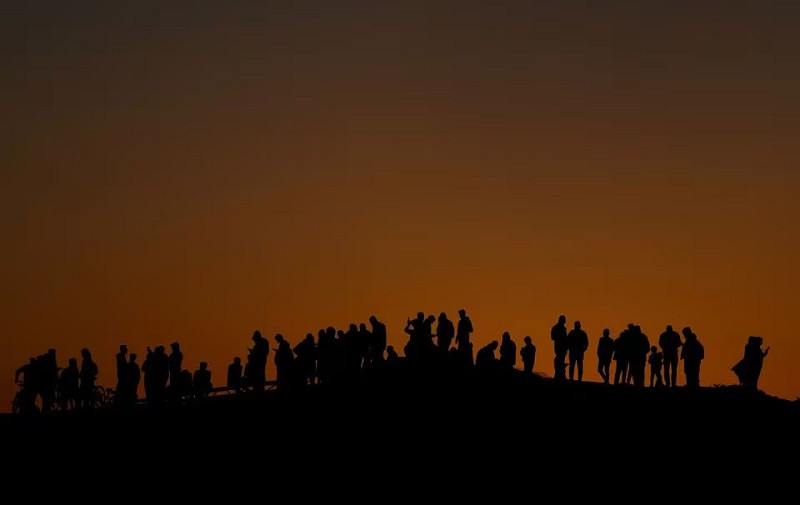CAIRO: Hamas stuck to its terms for a ceasefire deal and hostage exchange with Israel on Wednesday after the United States said truce talks in Cairo were “in the hands of” the Palestinian group.
Negotiators from Hamas, Qatar and Egypt – but not Israel – are in Cairo trying to secure a 40-day ceasefire in the war between Israel and Hamas in Gaza in time for the month of Ramazan, which begins early next week.
Urging Hamas to accept the terms on the table, President Joe Biden said on Tuesday that US ally Israel was cooperating and “a rational offer” had been made for a ceasefire in exchange for the release of Israeli hostages.
“It’s in the hands of Hamas right now,” Biden told reporters. “If we get to the circumstance that it [fighting] continues to Ramazan … it’s gonna be very dangerous.”
Hamas pledged to continue to take part in the Cairo talks, but Hamas officials said a ceasefire must be in place before hostages are released, Israel must withdraw from Gaza and all Gazans must be able to return to homes they were forced to flee.
“We are showing the required flexibility in order to reach a comprehensive cessation of aggression against our people, but the occupation is still evading the entitlements of this agreement,” Hamas said in a statement.
A source earlier said Israel was staying away from the Cairo talks because Hamas refused to provide a list of hostages who are still alive. Hamas says this is impossible without a ceasefire as hostages are scattered across the war zone.
Israeli forces, which began their offensive in Gaza after the deadly Hamas raid on Israel on Oct. 7, have continued bombarding the Palestinian enclave since the talks began in Cairo on Sunday, and the dire humanitarian situation in the densely populated coastal strip has deteriorated further.
“Every day costs us dozens of martyrs [dead]. We want a ceasefire now,” Shaban Abdel-Raouf, a Palestinian electrician and father of five from Gaza City, who is now in the southern city of Khan Younis, told Reuters via a chat app.
Residents of Khan Younis reported hearing explosions all night. Israeli warplanes struck areas of Al-Nuseirat refugee camp and Deir Al-Balah city in central Gaza, and part of the southern city of Rafah, witnesses said.
Health officials in Hamas-run Gaza said the number of people confirmed killed in Israel’s offensive had now passed 30,700, with 86 deaths reported in the past 24 hours.
Palestinian health officials later said seven people had been killed when Israeli forces fired on groups in central Gaza. Israel did not immediately comment on the report and the circumstances were unclear.
Deal on the table
A deal is being sought before Ramazan because Palestinian-Israeli violence in Israel and the occupied Palestinian territories often spikes during the fasting month, as does hostility towards Israel in the Arab and Muslim world, creating a strong incentive for leaders to clinch a deal before then.
The deal presented to Hamas would free some of the hostages it still holds following the Oct. 7 attack, in which Israel said 1,200 people were killed and 253 abducted.
Aid to Gaza would be increased to try to avert famine as hospitals treat acutely malnourished children, and Hamas would provide a list of all the hostages held in Gaza.
In Beirut, Hamas official Osama Hamdan said any exchange of prisoners cannot take place until after a ceasefire.
Israel wants merely a pause in fighting to get hostages out of Gaza and more aid in, and says it will not end the conflict before Hamas is “eliminated”.
Senior Hamas official Bassem Naim said Hamas had presented its own draft deal and was awaiting a response from Israel, and that “the ball now is in the Americans’ court”.
The United States on Tuesday revised language in a draft UN Security Council resolution to back “an immediate ceasefire of roughly six weeks in Gaza together with the release of all hostages”, according to the text seen by Reuters.

Displaced Palestinians try to get internet service on their phones through Egyptian networks to communicate with their relatives, in Rafah in the southern Gaza Strip. PHOTO: REUTERS
The third revision of the text – first proposed by the US two weeks ago – reflects blunt remarks by Vice President Kamala Harris urging Israel to do more to ease the “humanitarian catastrophe” in Gaza.
Echoing her comments, British Foreign Secretary David Cameron said he would warn visiting Israeli war cabinet member Benny Gantz on Wednesday that London’s patience was running thin over the “dreadful suffering” in Gaza.
Gaza health ministry spokesperson Ashraf Al-Qidra said on Wednesday a girl of 15 had died in a Gaza City hospital from dehydration and malnutrition, describing her as the 18th such victim in just over a week. Reuters could not verify the deaths.
Israel has said it is committed to improving the humanitarian situation in Gaza and there is no limit on the aid for civilians. It has blamed the United Nations for any delivery issues, saying limitations on the quantity and pace of aid are dependent on the capacity of the UN and other agencies.






















